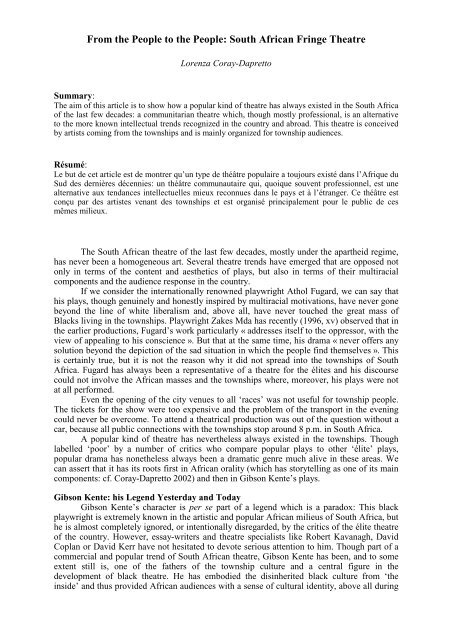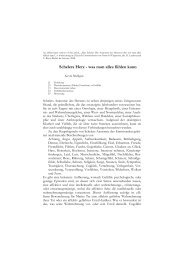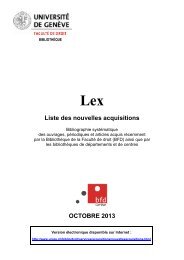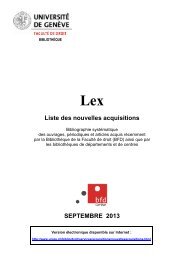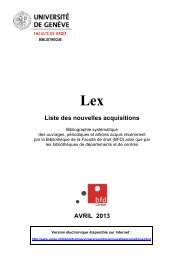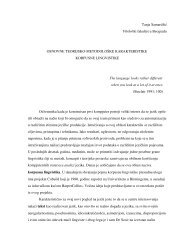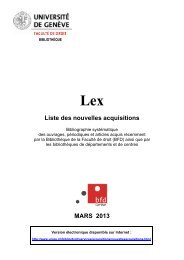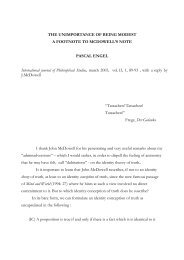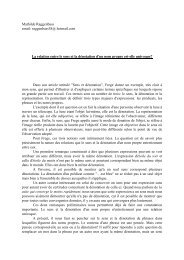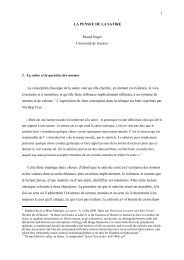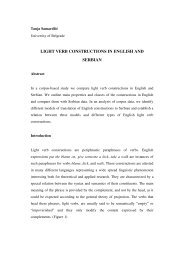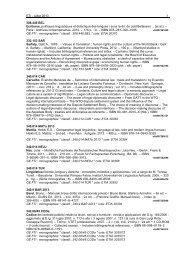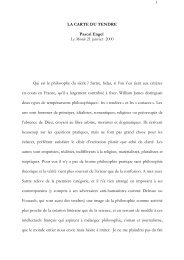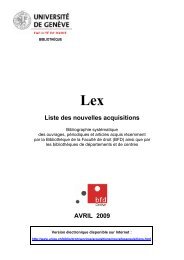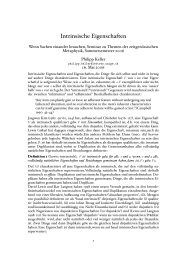From the People to the People: South African Fringe Theatre
From the People to the People: South African Fringe Theatre
From the People to the People: South African Fringe Theatre
You also want an ePaper? Increase the reach of your titles
YUMPU automatically turns print PDFs into web optimized ePapers that Google loves.
<strong>From</strong> <strong>the</strong> <strong>People</strong> <strong>to</strong> <strong>the</strong> <strong>People</strong>: <strong>South</strong> <strong>African</strong> <strong>Fringe</strong> <strong>Theatre</strong><br />
Lorenza Coray-Dapret<strong>to</strong><br />
Summary:<br />
The aim of this article is <strong>to</strong> show how a popular kind of <strong>the</strong>atre has always existed in <strong>the</strong> <strong>South</strong> Africa<br />
of <strong>the</strong> last few decades: a communitarian <strong>the</strong>atre which, though mostly professional, is an alternative<br />
<strong>to</strong> <strong>the</strong> more known intellectual trends recognized in <strong>the</strong> country and abroad. This <strong>the</strong>atre is conceived<br />
by artists coming from <strong>the</strong> <strong>to</strong>wnships and is mainly organized for <strong>to</strong>wnship audiences.<br />
Résumé:<br />
Le but de cet article est de montrer qu’un type de théâtre populaire a <strong>to</strong>ujours existé dans l’Afrique du<br />
Sud des dernières décennies: un théâtre communautaire qui, quoique souvent professionnel, est une<br />
alternative aux tendances intellectuelles mieux reconnues dans le pays et à l’étranger. Ce théâtre est<br />
conçu par des artistes venant des <strong>to</strong>wnships et est organisé principalement pour le public de ces<br />
mêmes milieux.<br />
The <strong>South</strong> <strong>African</strong> <strong>the</strong>atre of <strong>the</strong> last few decades, mostly under <strong>the</strong> apar<strong>the</strong>id regime,<br />
has never been a homogeneous art. Several <strong>the</strong>atre trends have emerged that are opposed not<br />
only in terms of <strong>the</strong> content and aes<strong>the</strong>tics of plays, but also in terms of <strong>the</strong>ir multiracial<br />
components and <strong>the</strong> audience response in <strong>the</strong> country.<br />
If we consider <strong>the</strong> internationally renowned playwright Athol Fugard, we can say that<br />
his plays, though genuinely and honestly inspired by multiracial motivations, have never gone<br />
beyond <strong>the</strong> line of white liberalism and, above all, have never <strong>to</strong>uched <strong>the</strong> great mass of<br />
Blacks living in <strong>the</strong> <strong>to</strong>wnships. Playwright Zakes Mda has recently (1996, xv) observed that in<br />
<strong>the</strong> earlier productions, Fugard’s work particularly « addresses itself <strong>to</strong> <strong>the</strong> oppressor, with <strong>the</strong><br />
view of appealing <strong>to</strong> his conscience ». But that at <strong>the</strong> same time, his drama « never offers any<br />
solution beyond <strong>the</strong> depiction of <strong>the</strong> sad situation in which <strong>the</strong> people find <strong>the</strong>mselves ». This<br />
is certainly true, but it is not <strong>the</strong> reason why it did not spread in<strong>to</strong> <strong>the</strong> <strong>to</strong>wnships of <strong>South</strong><br />
Africa. Fugard has always been a representative of a <strong>the</strong>atre for <strong>the</strong> élites and his discourse<br />
could not involve <strong>the</strong> <strong>African</strong> masses and <strong>the</strong> <strong>to</strong>wnships where, moreover, his plays were not<br />
at all performed.<br />
Even <strong>the</strong> opening of <strong>the</strong> city venues <strong>to</strong> all ‘races’ was not useful for <strong>to</strong>wnship people.<br />
The tickets for <strong>the</strong> show were <strong>to</strong>o expensive and <strong>the</strong> problem of <strong>the</strong> transport in <strong>the</strong> evening<br />
could never be overcome. To attend a <strong>the</strong>atrical production was out of <strong>the</strong> question without a<br />
car, because all public connections with <strong>the</strong> <strong>to</strong>wnships s<strong>to</strong>p around 8 p.m. in <strong>South</strong> Africa.<br />
A popular kind of <strong>the</strong>atre has never<strong>the</strong>less always existed in <strong>the</strong> <strong>to</strong>wnships. Though<br />
labelled ‘poor’ by a number of critics who compare popular plays <strong>to</strong> o<strong>the</strong>r ‘élite’ plays,<br />
popular drama has none<strong>the</strong>less always been a dramatic genre much alive in <strong>the</strong>se areas. We<br />
can assert that it has its roots first in <strong>African</strong> orality (which has s<strong>to</strong>rytelling as one of its main<br />
components: cf. Coray-Dapret<strong>to</strong> 2002) and <strong>the</strong>n in Gibson Kente’s plays.<br />
Gibson Kente: his Legend Yesterday and Today<br />
Gibson Kente’s character is per se part of a legend which is a paradox: This black<br />
playwright is extremely known in <strong>the</strong> artistic and popular <strong>African</strong> milieus of <strong>South</strong> Africa, but<br />
he is almost completely ignored, or intentionally disregarded, by <strong>the</strong> critics of <strong>the</strong> élite <strong>the</strong>atre<br />
of <strong>the</strong> country. However, essay-writers and <strong>the</strong>atre specialists like Robert Kavanagh, David<br />
Coplan or David Kerr have not hesitated <strong>to</strong> devote serious attention <strong>to</strong> him. Though part of a<br />
commercial and popular trend of <strong>South</strong> <strong>African</strong> <strong>the</strong>atre, Gibson Kente has been, and <strong>to</strong> some<br />
extent still is, one of <strong>the</strong> fa<strong>the</strong>rs of <strong>the</strong> <strong>to</strong>wnship culture and a central figure in <strong>the</strong><br />
development of black <strong>the</strong>atre. He has embodied <strong>the</strong> disinherited black culture from ‘<strong>the</strong><br />
inside’ and thus provided <strong>African</strong> audiences with a sense of cultural identity, above all during
<strong>the</strong> period 1966-67 up <strong>to</strong> his detention in 1976, which corresponds <strong>to</strong> a special paren<strong>the</strong>sis in<br />
his life, because Kente was not a mainly political playwright.<br />
Born in <strong>the</strong> Eastern Cape, Kente came from <strong>the</strong> Xhosa area. In his youth he was<br />
influenced by traditional music and Christian hymns. His plays are a fusion of texts, music,<br />
dance and songs. As is well known, <strong>African</strong> tradition cherishes <strong>the</strong> fusion of all <strong>the</strong>se artistic<br />
fields in its performances and social events. Kente chose <strong>the</strong> English language for his plays,<br />
but one can estimate that <strong>the</strong>se are based on a non-English culture where hybridisation is <strong>the</strong><br />
most common feature. In Coplan’s words Kente’s music is heavily influenced by Afro-<br />
American music and it is a mixing of <strong>African</strong> gospels, <strong>to</strong>wnship jazz and local music.<br />
The reasons why Gibson Kente’s plays were so popular in <strong>the</strong> workers’ social class of<br />
<strong>the</strong> time are multiple. While he depicted <strong>the</strong> stereotypes of <strong>the</strong> black urban culture of <strong>the</strong><br />
period with its gangsters, jazz and shebeens (illegal places where one could find alcohol), he<br />
also dramatised <strong>the</strong> everyday life <strong>to</strong> make it a real event. As Ndlovu emphasises (1986,<br />
p. xxiii) « Most <strong>to</strong>wnship <strong>the</strong>ater-goers were families who went <strong>to</strong> <strong>the</strong> <strong>the</strong>ater <strong>to</strong> share in an<br />
event, music, laughter, joy, exuberance, and sorrow. Kente’s milder plays provided all <strong>the</strong>se<br />
things in one evening with huge casts that included dancers, singers, and ‘<strong>to</strong>wnship<br />
characters’ that brought his audience <strong>to</strong> tears with laughter and sadness. » We can consider<br />
this kind of <strong>the</strong>atre as an extension of <strong>the</strong> oral tradition that even nowadays is so much part of<br />
<strong>the</strong> <strong>South</strong> <strong>African</strong> way of life.<br />
Kente’s company also had ano<strong>the</strong>r peculiarity for his time: it was an independent<br />
one: that is <strong>to</strong> say « independent from <strong>the</strong> white power » that till <strong>the</strong>n had subsidised and even<br />
completely controlled black artists on <strong>the</strong> stage. Kente was a professional in his role of<br />
businessman/direc<strong>to</strong>r and <strong>the</strong> catharsis that people realised in attending his plays largely<br />
compensated <strong>the</strong> fact that wider political issues were not addressed by his work. His<br />
stereotyped characters were also accepted because <strong>the</strong>y were part of a common culture and his<br />
plays expressed a sincere desire <strong>to</strong> show things positively on <strong>the</strong> basis of an <strong>African</strong> Christian<br />
perspective.<br />
Yet, in <strong>the</strong> ’70s, <strong>South</strong> <strong>African</strong> dramatic political his<strong>to</strong>ry generated different attitudes<br />
<strong>to</strong>wards <strong>the</strong>atre among various playwrights. Matsemela Manaka and his Soyikwa <strong>African</strong><br />
Company (1976), influenced by <strong>the</strong> advent of <strong>the</strong> Black Consciousness movement and <strong>the</strong>atre,<br />
had a different approach. This dramatist and political activist, who had a close relationship<br />
with <strong>the</strong> audience and addressed himself directly <strong>to</strong> <strong>the</strong> working class by casting workingclass<br />
ac<strong>to</strong>rs in his plays, was influenced like Kente by indigenous <strong>South</strong> <strong>African</strong> traditions<br />
such as Xhosa s<strong>to</strong>ry-telling. He was also inspired by West <strong>African</strong> <strong>the</strong>atre – particularly that of<br />
Wole Soyinka, whose name was echoed in <strong>the</strong> name of <strong>the</strong> company – and <strong>the</strong> ‘Poor <strong>Theatre</strong>’<br />
techniques of Polish direc<strong>to</strong>r Jerzy Gro<strong>to</strong>wski, from whom Manaka learned « <strong>the</strong> prime<br />
importance of <strong>the</strong> ac<strong>to</strong>r’s creative, bodily and vocal resources » (cf. D. Kerr, 1995, 232).<br />
As times changed, <strong>the</strong> traditional audience captivated by Kente’s work was no longer<br />
completely satisfied by <strong>the</strong> simple representation of <strong>the</strong>ir experience realised by this<br />
playwright. In <strong>the</strong> middle of <strong>the</strong> ’70s his plays How Long, I believe and Too Late became<br />
more political, but his arrest in 1976 (<strong>the</strong> period of <strong>the</strong> Sowe<strong>to</strong> uprising) while attempting <strong>to</strong><br />
film How Long in Kingwilliams<strong>to</strong>wn, rapidly put an end <strong>to</strong> his political claims. Later on with<br />
Mama and <strong>the</strong> Load (1980) and o<strong>the</strong>r plays of <strong>the</strong> same period Kente marked a return <strong>to</strong> his<br />
<strong>the</strong>atre of ‘self-realisation’ (Kerr, 1995, p. 221), where <strong>the</strong> central <strong>the</strong>mes are « poverty and<br />
family disintegration, <strong>the</strong> decline of adult moral authority and guidance, and <strong>the</strong> need for<br />
renewed kinship and community among urban blacks. » (Coplan, 1985, p. 212)<br />
Twenty years later, Gibson Kente is still a legend in <strong>the</strong> <strong>to</strong>wnships, but his popularity<br />
is not free from criticism. In 1997 <strong>the</strong> « Bra Gibson Kente <strong>Theatre</strong> » was opened and called<br />
after him in Sharpeville. He has recently worked for television and in 1998 <strong>the</strong> Civic <strong>Theatre</strong><br />
organised a Tribute <strong>to</strong> him on <strong>the</strong> basis of his 29 musicals, but, in <strong>the</strong> words of Charl Blignaut<br />
(Mail & Guardian, 23 April 1998), during <strong>the</strong> tribute <strong>the</strong> song and dance were <strong>the</strong>re, but <strong>the</strong>re<br />
was no drama, no enactment … absolutely no picture of <strong>the</strong> grittiness of <strong>the</strong> era being painted<br />
on stage. In February 2001 Kente produced his latest play Ezakithi (“It is us”). Gwen Ansell<br />
(Mail & Guardian, 9 February 2001) says that <strong>the</strong> play has all of Kente’s typical ingredients<br />
that fuse tradition and urban style, but <strong>the</strong> problem lies in <strong>the</strong> play’s politics. In spite of<br />
2
Kente’s assertion that he would cut politics out of <strong>the</strong> play, Ansell thinks that in his play he<br />
conveyed a deeply conservative political message « where <strong>South</strong> <strong>African</strong> his<strong>to</strong>ry is rewritten<br />
as a tale of liberal accommodation <strong>to</strong> create a ‘salad nation’ with no acknowledgement of<br />
struggle or suffering ». Kente was certainly a pioneer in creating a new language for <strong>South</strong><br />
<strong>African</strong> musical <strong>the</strong>atre three decades ago, but he has apparently not renewed his talent, and<br />
<strong>the</strong> influence of his legend has developed independently of him.<br />
When <strong>the</strong> Legend Diversifies and Produces Good Fruits<br />
Playwrights such as Mbongeni Ngema and Percy Mtwa <strong>to</strong>ured with Kente (<strong>the</strong> former<br />
as lead ac<strong>to</strong>r and <strong>the</strong> latter as singer and dancer) in Mama and <strong>the</strong> Load when <strong>the</strong>y decided <strong>to</strong><br />
collaborate on a play of <strong>the</strong>ir own. Ndlovu (1986, pp. xxii-xxvi) tells us that <strong>the</strong>y left Kente<br />
and his material, artistic and psychological security <strong>to</strong> spend a year writing and rehearsing in<br />
kitchens, bedrooms, cars, buses, trains, backyards, <strong>to</strong> try and produce a play concerning a<br />
« second coming of Jesus », specifically <strong>to</strong> <strong>South</strong> Africa, and <strong>to</strong> treat <strong>the</strong> questions and<br />
expectations that this fact would have in <strong>the</strong> country of apar<strong>the</strong>id. After <strong>the</strong>y approached<br />
Barney Simon from <strong>the</strong> Market <strong>Theatre</strong> in Johannesburg, one <strong>the</strong> white direc<strong>to</strong>rs most<br />
involved with multiracial drama, Woza Albert! (1981) was created within this collaboration.<br />
The play became one of <strong>the</strong> biggest <strong>the</strong>atrical events in <strong>South</strong> Africa and abroad: it won many<br />
awards in Edinburgh, Los Angeles and elsewhere (we saw its French edition in Paris under <strong>the</strong><br />
direction of Peter Brook at <strong>the</strong> Bouffes du Nord in 1989), but « most importantly, <strong>the</strong>y<br />
[Ngema and Mtwa] performed in <strong>the</strong> <strong>to</strong>wnships of <strong>South</strong> Africa, as well as <strong>the</strong> cities,<br />
whenever <strong>the</strong>y were in <strong>the</strong> country and were thus accessible <strong>to</strong> a much wider audience. »<br />
(Ibidem, p. xxiv) Ndlovu asserts that Woza Albert! had been created for <strong>the</strong> <strong>to</strong>wnships because<br />
of <strong>the</strong> « abundant energy and a rhythm that gave <strong>the</strong> play a strong musical feeling ». He also<br />
emphasises that <strong>to</strong>wnship audiences were now more prepared for this kind of agitprop <strong>the</strong>atre<br />
after <strong>the</strong> uprising of 1976 in Sowe<strong>to</strong>, <strong>the</strong> strong presence of « Black Consciousness » and <strong>the</strong><br />
formation of <strong>the</strong> Medupe Writers Associations and of o<strong>the</strong>r similar cultural groups in <strong>the</strong><br />
country (ibidem).<br />
After this big success both Ngema and Mtwa in 1985 wrote some new plays<br />
Asinamali! (“We have no money!”) and Bopha! (“Arrest him!”). The idea of a rent strike in<br />
<strong>the</strong> Lamontville <strong>to</strong>wnship in 1983 gave Ngema <strong>the</strong> idea for Asinamali!, while Mtwa’s Bopha!<br />
concerned a black policeman arresting <strong>the</strong>ir own people and even members of his own family.<br />
Both plays were quite explosive because <strong>the</strong>y were based on life in <strong>the</strong> <strong>to</strong>wnships at that time<br />
and <strong>the</strong>y addressed <strong>the</strong>ir residents directly. In spite of <strong>the</strong>ir tragic content, <strong>the</strong>y were full of life<br />
and not deprived of humour. Ndlovu emphasises (and we fully agree with him as we have<br />
seen Bopha in Bad Boll, Germany) that, in opposition <strong>to</strong> white <strong>South</strong> <strong>African</strong> writers’ plays,<br />
<strong>the</strong>se works were able <strong>to</strong> offer a vision of hope in giving direction, asking questions,<br />
providing answers, and telling audiences that things will change in <strong>the</strong> country sooner than<br />
most people think.<br />
The rise and fall of Mbongeni Ngema with his two plays Sarafina I (1987) and<br />
Sarafina II (1996) are recent his<strong>to</strong>ry. The first play has been a very big world success, but<br />
most <strong>South</strong> <strong>African</strong> <strong>to</strong>wnship residents have never had <strong>the</strong> possibility <strong>to</strong> see this play<br />
(influenced by <strong>the</strong> big American productions) for lack of appropriate <strong>the</strong>atres or places of<br />
entertainment. Sarafina II, which received one fifth of <strong>the</strong> budget of <strong>the</strong> Health Ministry <strong>to</strong><br />
deal with <strong>the</strong> problem of AIDS, was a big flop and <strong>the</strong> scandal of <strong>the</strong> year. It was also <strong>the</strong><br />
evidence of Ngema’s ‘arrogance’ in behaving with people and money. A proof that even <strong>the</strong><br />
most gifted artist can go astray. As for dramatist Percy Mtwa, after a period of trouble due <strong>to</strong><br />
his opposition <strong>to</strong> American Hollywood film-makers who misinterpreted his play Bopha and<br />
his expensive lawsuit against <strong>the</strong>m, he disappeared from <strong>the</strong> scene for several years. In 1998<br />
he was appointed artistic direc<strong>to</strong>r at <strong>the</strong> Windybrow <strong>the</strong>atre in Johannesburg. This <strong>the</strong>atre is<br />
committed <strong>to</strong> put community-based plays on a professional stage. Mtwa is now back in <strong>the</strong><br />
limelight as a playwright and has recently produced a play The Patriot at <strong>the</strong> Barney Simon<br />
<strong>Theatre</strong> at <strong>the</strong> Market. In this play two performers, Peter Mashigo and Lebohang Elephant,<br />
play a multitude of roles standing in a interminable queue at <strong>the</strong> polling booth. A mix of high<br />
comedy and real tragedy « gives <strong>the</strong> play a Woza Albert! feeling and offers a thought-<br />
3
provoking, feel-good evening at <strong>the</strong> <strong>the</strong>atre ». Though not a perfect play « it should be seen for<br />
a variety of reasons, not <strong>the</strong> least being that at last <strong>South</strong> <strong>African</strong> <strong>the</strong>atre is moving away from<br />
racial and political <strong>the</strong>mes <strong>to</strong>wards more universal concerns. » (Cf. Pat Schwartz - Mail &<br />
Guardian - 7/3/2002).<br />
Thulani Sifeni Mtshali: Inside <strong>the</strong> Community<br />
We met <strong>the</strong> members of <strong>the</strong> Bachaki <strong>Theatre</strong> in 1993 at <strong>the</strong> <strong>South</strong> <strong>African</strong> « Standard<br />
Bank National Arts Festival » in Grahams<strong>to</strong>wn where <strong>the</strong>y performed Golden Gloves<br />
(Grahams<strong>to</strong>wn Festival’s best of <strong>the</strong> <strong>Fringe</strong> Award of <strong>the</strong> year and Vita Award of <strong>the</strong><br />
Windybrow Festival of <strong>the</strong> same year). <strong>From</strong> that time on, Thulani Sifeni Mtshali and his<br />
collabora<strong>to</strong>rs Thabo Mabe and Kagiso Mbhele have become part of our life and important<br />
informants for our research about <strong>South</strong> <strong>African</strong> <strong>Theatre</strong>. The birth of <strong>the</strong> Bachaki <strong>Theatre</strong><br />
(Bachaki meaning “visi<strong>to</strong>rs” or “travellers”) goes back <strong>to</strong> 1987 when a group of Artists from<br />
various <strong>to</strong>wnships such as Sowe<strong>to</strong>, Atteridgeville and Vosloorus, after thirteen months of<br />
research, workshops and writing, presented <strong>the</strong>ir first production, Top Down – The Law of<br />
Nature. The play was first conceived for a two week visi<strong>to</strong>rs season, where five persons a day<br />
were invited <strong>to</strong> a flat <strong>to</strong> watch rehearsals and discuss <strong>the</strong> play afterwards. The play was a<br />
thought-provoking examination of a black teacher’s experience within <strong>the</strong> <strong>African</strong> education<br />
system of <strong>the</strong> time (a period full of open struggles against apar<strong>the</strong>id and of repeated states of<br />
emergency) and it was first performed publicly on 19th March 1988 at Joubert Park<br />
Presbyterian Ca<strong>the</strong>dral. It <strong>the</strong>n played in several <strong>to</strong>wnships in <strong>South</strong> Africa and in such known<br />
places as <strong>the</strong> Market <strong>Theatre</strong> or <strong>the</strong> Funda Arts Centre (seat of Manaka’s Soyikwa Institute of<br />
<strong>African</strong> <strong>Theatre</strong> in Sowe<strong>to</strong>). Then it <strong>to</strong>ured abroad in <strong>the</strong> United Kingdom (S.O.A.S., Leeds<br />
university etc.) and briefly in Basel, Switzerland. Never<strong>the</strong>less <strong>the</strong> main aim of <strong>the</strong> Bachaki<br />
<strong>Theatre</strong> was « <strong>to</strong> bring <strong>the</strong>atre back <strong>to</strong> <strong>the</strong> <strong>to</strong>wnships », <strong>to</strong> whatever venues still existed in<br />
<strong>the</strong>se areas set aside for non-White occupation by apar<strong>the</strong>id in <strong>South</strong> Africa. In Japtha<br />
Mphahlani’s words, one of <strong>the</strong> organisers of <strong>the</strong> drive <strong>to</strong> revive <strong>to</strong>wnship <strong>the</strong>atre in 1993, it<br />
was simply a question <strong>to</strong> get <strong>the</strong>atre back « <strong>to</strong> our natural setting ». It was also a question <strong>to</strong><br />
recreate with <strong>the</strong> audience that dialogue about a social dilemma, which had existed in <strong>the</strong><br />
times of Kente’s productions; and <strong>to</strong> express it through drama, singing and dance. Bachaki got<br />
out <strong>to</strong> <strong>the</strong> <strong>to</strong>wnships and created (without resources) grass-roots <strong>the</strong>atre which was both<br />
educational and entertaining. Mtshali, Mabe and Mbhele were of course talented interpreters<br />
(and Thulani Sifeni Mtshali an inspired community-leader as we prefer <strong>to</strong> say instead of<br />
direc<strong>to</strong>r!): in addition <strong>to</strong> a real sense of <strong>the</strong>atre <strong>the</strong>y were skilled in body language which<br />
allowed <strong>the</strong>m <strong>to</strong> play a whole range of characters, and sometimes also <strong>to</strong> make understand<br />
languages different from English <strong>to</strong> non-English speakers, in <strong>the</strong> pure tradition of <strong>African</strong><br />
s<strong>to</strong>rytelling.<br />
The success of Top Down gave Bachaki’s <strong>the</strong>atre a very good reputation and <strong>the</strong><br />
possibility and willingness <strong>to</strong> organise regular <strong>the</strong>atre workshops with <strong>the</strong> youth (students and<br />
unemployed) in Pimville (Sowe<strong>to</strong>), but <strong>the</strong> Bachaki still had no funds, no accommodation and<br />
no rehearsal space. So <strong>the</strong> creation of Golden Gloves was a real challenge for <strong>the</strong> group who<br />
decided <strong>to</strong> work and rehearse under <strong>the</strong> trees near <strong>the</strong> Orlando Power Station (Sowe<strong>to</strong>). They<br />
showed us <strong>the</strong> place, which we have filmed in a video; what we remember are two or three<br />
cows ruminating around, <strong>the</strong> cold wind and <strong>the</strong> Power-Station’s discharge-water channel that<br />
you had <strong>to</strong> cross <strong>to</strong> reach <strong>the</strong> place.<br />
All <strong>the</strong> plays created by <strong>the</strong> Bachaki are connected with socio-political <strong>the</strong>mes typical<br />
of <strong>South</strong> <strong>African</strong> society, but <strong>the</strong> group, and specifically Thulani Mtshali, have never used<br />
<strong>the</strong>atre as a direct political weapon. The s<strong>to</strong>ries have in fact been conceived <strong>to</strong> show <strong>the</strong><br />
consequences of a specific political system on <strong>the</strong> people of <strong>the</strong> country and <strong>the</strong>ir fight <strong>to</strong><br />
oppose it. Golden Gloves speaks of <strong>the</strong> expectations of Vusi, who, after having at last received<br />
his matric (<strong>the</strong> <strong>South</strong> <strong>African</strong> secondary school diploma), dreams of getting a job, becoming<br />
rich, conquering <strong>the</strong> girl he loves. He is quickly disillusioned: all doors are closed for him.<br />
The racial and class discriminations are still <strong>the</strong>re <strong>to</strong> remind him that he is nothing even with<br />
his cherished certificate. When, in <strong>the</strong> end, he is at last employed with two o<strong>the</strong>r colleagues in<br />
an insurance firm called Golden Gloves it is only <strong>to</strong> be better cheated by <strong>the</strong> dishonest head of<br />
4
<strong>the</strong> company, who absconds with all <strong>the</strong> money that <strong>the</strong>y had so hardly collected through <strong>the</strong><br />
insurance contracts. A very serious subject which is treated in <strong>the</strong> style of a comedy, with<br />
songs and dance, and in <strong>the</strong> traditional structure of sketches, where many different characters<br />
are depicted and voluntarily stereotyped <strong>to</strong> produce a rhythm full of life and freshness, in spite<br />
of <strong>the</strong> <strong>to</strong>uching insight.<br />
If some critics think that plays of this kind are not complex enough and find <strong>the</strong>ir<br />
narrative a little rough, <strong>the</strong>y cannot deny <strong>the</strong>ir honesty and forthrightness (Cue, 9/7/1993).<br />
Bachaki’s commitment is <strong>to</strong> develop <strong>African</strong> <strong>the</strong>atre <strong>to</strong> reflect people’s conditions « in <strong>the</strong><br />
most meaningful, constructive and truthful manner », as Thulani Sifeni Mtshali explains.<br />
« We consider ourselves professional artists although we are not accorded that status because<br />
we are based in <strong>the</strong> <strong>to</strong>wnships. » (Cf. Sifeni Mtshali’s interview <strong>to</strong> Sandile Memela, City<br />
Press, 25/4/1993)<br />
In July 1996 <strong>the</strong> Bachaki premiered ano<strong>the</strong>r play Weemen (a blend of “we” and<br />
“women”) at <strong>the</strong> Grahams<strong>to</strong>wn festival. Based on a real s<strong>to</strong>ry of domestic violence<br />
experienced by an aunt of Sifeni Mtshali, this play and its detailed comment have been<br />
included in Perkins’ anthology on Black <strong>South</strong> <strong>African</strong> Women (1999, pp. 102-112). The<br />
s<strong>to</strong>ry is captivating and well structured, never<strong>the</strong>less it did not have <strong>the</strong> success it deserved.<br />
The subject was in fact still taboo for <strong>the</strong> stage at <strong>the</strong> time and Mtshali says that « After seeing<br />
<strong>the</strong> show, many people were surprised that a man had written this play… », but he realised<br />
that it was something that he had <strong>to</strong> express as an artist, not only as part of a personal<br />
experience, but because it was a phenomenon common <strong>to</strong> many o<strong>the</strong>r families (ibidem,<br />
p. 103). The Bachaki also decided <strong>to</strong> revive Golden Gloves whose subject, unluckily, is not at<br />
all out of date in contemporary <strong>South</strong> Africa, and <strong>the</strong>y added some new appropriate cues <strong>to</strong> <strong>the</strong><br />
play. (We had <strong>the</strong> opportunity and luck <strong>to</strong> film it completely in 1999 in Johannesburg.) They<br />
recently <strong>to</strong>ok it in performance all over <strong>the</strong> country, especially <strong>to</strong> <strong>the</strong> <strong>to</strong>wnships where <strong>the</strong>y<br />
also organised many workshops, and again it was a big success. “<strong>From</strong> <strong>the</strong> people <strong>to</strong> <strong>the</strong><br />
people”-<strong>the</strong>atre is deeply rooted in <strong>South</strong> Africa: it is an alternative network <strong>to</strong> that of <strong>the</strong><br />
established organisations of <strong>the</strong> big cities. <strong>Theatre</strong> workshops are also very often organised in<br />
<strong>the</strong> schools and arouse a lot of interest. Many o<strong>the</strong>r groups more or less known compose this<br />
réseau of grass-roots performance: we pay a sincere tribute <strong>to</strong> <strong>the</strong>m and <strong>to</strong> <strong>the</strong>ir commitment<br />
<strong>to</strong> <strong>to</strong>wnship residents. We particularly remember with emotion and love Thulani Sifeni<br />
Mtshali, who lost his life on 5th March 2002 in a car accident, caused by somebody’s<br />
irresponsible behaviour. With Matsemela Manaka, in July 1998, <strong>the</strong>atre lost two of its more<br />
genuine members, always keen <strong>to</strong> serve <strong>the</strong>ir people.<br />
Luckily ideas, most of <strong>the</strong> time, do not die with people. Thabo Mabe has thus taken up<br />
<strong>the</strong> <strong>to</strong>rch of <strong>the</strong> Bachaki <strong>Theatre</strong>; he has also now involved one of <strong>the</strong> ancient cofounders of<br />
<strong>the</strong> Bachaki in<strong>to</strong> it: Angifi Proc<strong>to</strong>r Dladla is a playwright and a teacher of his<strong>to</strong>ry and<br />
language; he also teaches writing and <strong>the</strong>atre <strong>to</strong> inmates at Boksburg Prison.<br />
The Bachaki <strong>Theatre</strong> is now working on a project which tends <strong>to</strong> spread <strong>the</strong>atre in<strong>to</strong><br />
<strong>the</strong> high-schools through <strong>the</strong> organization of workshops, drama competitions and drama<br />
festivals. S<strong>to</strong>ry-telling sessions for pupils are also developed in primary schools.<br />
The aim of <strong>the</strong> Bachaki <strong>to</strong> bring <strong>the</strong>atre back <strong>to</strong> <strong>the</strong> people (and <strong>to</strong> <strong>the</strong> <strong>to</strong>wnships<br />
through performances and <strong>the</strong> different school activities mentioned) is <strong>the</strong>refore going on and<br />
on. This <strong>the</strong>atre is a form of humanity in <strong>the</strong> choice of <strong>the</strong> subjects and in <strong>the</strong> prime<br />
involvement of its conceivers, who make <strong>the</strong> audience become real contribu<strong>to</strong>rs of <strong>the</strong>ir work<br />
in progress. It creates a fruitful background for a <strong>the</strong>atre coming from <strong>the</strong> people and at <strong>the</strong><br />
same time concerning people, <strong>the</strong>ir experiences in life, and <strong>the</strong> multiple sensitive facets of<br />
<strong>the</strong>ir inner souls.<br />
5
Works Cited:<br />
Bachaki <strong>Theatre</strong> & Coray-Dapret<strong>to</strong> L. Golden Gloves, video, Johannesburg, 18/8/1999.<br />
Coplan, D. In Township Tonight: <strong>South</strong> <strong>African</strong> Black City Music and <strong>Theatre</strong>, Longman, Harlow,<br />
1985.<br />
Coray-Dapret<strong>to</strong>, L. Le Théâtre Communautaire Sud-Africain. L'Harmattan, Paris, 1996.<br />
Coray-Dapret<strong>to</strong>, L. Du théâtre sud-africain d'élite au théâtre populaire. Africultures, no. 4 (janvier<br />
1998), 15–20.<br />
Coray-Dapret<strong>to</strong>, L. <strong>South</strong> <strong>African</strong> contemporary s<strong>to</strong>rytelling; <strong>the</strong> urban areas in between tradition and<br />
modernity; in: Actes du Congrès de l'ISOLA (Chambéry 2002), à paraître.<br />
Fugard, A. The Township Plays. Oxford University Press, Oxford, 1993 (Introduction by D. Walder).<br />
Kavanagh, R. M. <strong>Theatre</strong> and Cultural Struggles in <strong>South</strong> Africa. Zed Books, London, 1985.<br />
Kerr, D. <strong>African</strong> Popular <strong>Theatre</strong>. James Currey, London, 1995.<br />
Mda, Z. Introduction: An Overview of <strong>Theatre</strong> in <strong>South</strong> Africa; in: Z. Mda, Four Plays (Florida Hills,<br />
S.A.: Vivlia, 1996): vi-xxvi.<br />
Ndlovu, D. (ed.) Woza Afrika! An Anthology of <strong>South</strong> <strong>African</strong> Plays (Foreword by W. Soyinka,<br />
Preface by A. Baraka). George Braziller, New York, 1986.<br />
Perkins, K. A. (ed.) Black <strong>South</strong> <strong>African</strong> Women: An Anthology of Plays. Routledge, London - New<br />
York, 1998–1999.<br />
Lorenza Coray-Dapret<strong>to</strong><br />
University of Geneva<br />
6


